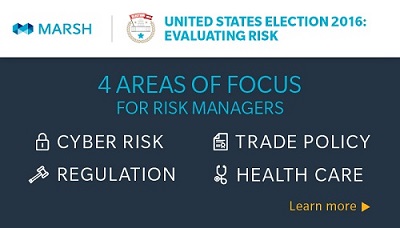The inauguration of President-elect Donald Trump on January 20, 2017, paired with a Republican-controlled Congress, promises to affect US government policy in areas ranging from trade to regulations to health care. There’s little doubt that 2017 will be a year of change in Washington DC, and beyond.
Areas likely to experience changes in 2017 and beyond include:
- Health Care Policy: On the campaign trail, then-candidate Trump said he would repeal and replace the Affordable Care Act (ACA) — Obamacare — but has since said parts of the law should remain. Major changes in the health insurance marketplace are unlikely to take effect in 2017. However, there is much uncertainty for health care organizations regarding the ACA and other regulatory areas. Even before the election, 84% of health care organizations said their next critical risks were likely to emerge from regulatory issues, according to the Marsh’s 2016 Excellence in Risk Management Survey.
- Trade Policy: President-elect Trump has promised to get tough on trade. Areas he may focus on include changing the North American Free Trade Agreement (NAFTA); blocking the Trans-Pacific Partnership deal; stopping “unfair” imports and trade practices; and retaining and returning manufacturing jobs various reforms. Yet even with a Republican majority, implementing a new US trade agenda may take considerable time.
- Regulatory Policy: Easing government regulations on business is another stated priority for President-elect Trump. Although a less strict regulatory environment is generally perceived as a positive for the private sector, any rollback will affect particular sectors and companies differently. The precise areas of risk and opportunity will vary across and within industries.
- Cybersecurity: Anxiety over cybersecurity was a central theme throughout the 2016 campaign and is likely to continue to resonate in 2017. President-elect Trump has said his plans could include: reviewing cyber defenses and vulnerabilities; coordinating law enforcement responses to cyber threats through the Department of Justice; seeking enhancements to the US Cyber Command; and developing offensive cyber capabilities.
We’ll be updating this page as details emerge about the plans of President-elect Trump and Congress heading into 2017.

